With Comcast and Time-Warner now moving forward with video paywalls, are the cable companies doing what Hollywood and the music industry couldn’t do? Profit from the Internet… by forcing viewers to keep their cable subscriptions? That reality is coming sooner than you think.
WHITE SPACE
Hulu… you said you were aliens and that’s how you rolled. You promised good times with unlimited television shows, movies, and clips, all in high quality and subsidized by ads through the goodwill of Disney/ABC, NBC and other media conglomerates with an interest in beating Google’s YouTube at its own game. You promised to transform the way people consumed entertainment, and your approach really was a grand and noble effort in the right direction… a future where cable subscriptions would become superfluous and where the consumer would determine the programming choices rather than a distant scheduling guru with dubious tastes and a mathematical algorithm or some arcane Nielsen report. Voila! Shows that would once be consigned to the syndication or the land of forgotten pilots (where Amelia Earhart probably watches them endlessly) would be well loved by the niche, the quirky and the geek in every demographic.
Ah Hulu… you were pretty awesome. But you say you’re going subscription (currently delayed), and worse, there’s  actual competition out there that may do things better than you do, and even worse? You’re hated by the cable industry… in particular Comcast and Time-Warner, and a host of other, lesser cable moguls who see you sapping away their profits from ads, while they pay hefty rebroadcast fees to continue to carry network shows and studio movies. You’re changing, Hulu… due to pressure not from consumers, but from your competitors, and that’s a shame.
actual competition out there that may do things better than you do, and even worse? You’re hated by the cable industry… in particular Comcast and Time-Warner, and a host of other, lesser cable moguls who see you sapping away their profits from ads, while they pay hefty rebroadcast fees to continue to carry network shows and studio movies. You’re changing, Hulu… due to pressure not from consumers, but from your competitors, and that’s a shame.
Apple TV… you still haven’t quite come close to your promise: to bring the best in high-definition viewing, à la carte, into the home… merging the computing experience with television to make it easier to find video-on-demand programming while also allowing for unique experiences like YouTube and Flickr to be seen on those new HDTVs. Still young, you’ve yet to make major licensing arrangements and are facing the same hostility from network and cable 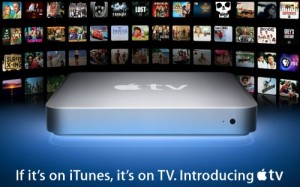 competitors as Hulu has experienced. This isn’t the music business, apparently… there’s still life in old dinosaur methods of content delivery when it comes to movies and teevee shows, and the congolomerates and CEO’s that control them aren’t too keen on giving up their domination of content delivery services just yet. Thus far, Apple TV, you’ve yet to support Silverlight for Netflix viewing via Boxee’s app though Netflix may soon be more accommodating to you, as their iPad app is currently the device’s killer app and an iPhone version is reported to be on the way (perhaps with iPhone 4.0). You also have yet to really score with any alliances with Amazon, Pandora (though Boxee’s app supports it, Apple TV does not directly support it), any other internet radio services outside of iTunes offerings, or major content providers or aggregators such as Hulu, Comedy Central, CBS and other heavy-weights in broadband delivery of popular entertainment. Oh, and don’t forget… Google is about to launch their own Internet TV software that will directly compete with your core concept, even as you’re about to launch your own subscription service for teevee (that is, if you can get any of the majors to sign on and license content to you).
competitors as Hulu has experienced. This isn’t the music business, apparently… there’s still life in old dinosaur methods of content delivery when it comes to movies and teevee shows, and the congolomerates and CEO’s that control them aren’t too keen on giving up their domination of content delivery services just yet. Thus far, Apple TV, you’ve yet to support Silverlight for Netflix viewing via Boxee’s app though Netflix may soon be more accommodating to you, as their iPad app is currently the device’s killer app and an iPhone version is reported to be on the way (perhaps with iPhone 4.0). You also have yet to really score with any alliances with Amazon, Pandora (though Boxee’s app supports it, Apple TV does not directly support it), any other internet radio services outside of iTunes offerings, or major content providers or aggregators such as Hulu, Comedy Central, CBS and other heavy-weights in broadband delivery of popular entertainment. Oh, and don’t forget… Google is about to launch their own Internet TV software that will directly compete with your core concept, even as you’re about to launch your own subscription service for teevee (that is, if you can get any of the majors to sign on and license content to you).
And YouTube… well, let’s just say Happy 5th Birthday, and leave it at that. You still offer the best way to get amateur and prosumer produced content, legal or not, but have yet to harness any viable means to get legitimate content that would keep viewers glued to the site for more than the several minutes it takes Hitler to rant about being a meme on YouTube.
Only a few years ago, it seemed that content delivery was getting simplified, and the offer of free content for viewing a few ads seemed a rather perfect way to time-shift favorite cable shows such as South Park and The Daily Show as well as network favorites like Lost and CSI. It seemed, for a brief moment in time, that the old media companies were realizing that in order to stem piracy of their content and prevent a nearly complete obliteration of their profit line from occurring similar to what the music industry experienced when CD purchases cratered due to illegal and legal means of procuring music. They seemed to be realizing that they had to adjust to new realities in viewership and consumption of content. No longer were people tied to programming schedules with time-shifting devices like TiVo and other DVR’s (a movement which the cable companies quickly jumped on and dominated… taking the glow off TiVo completely). It seemed like a good bet for regular ol’ teevee programming anyway… that it would remain free when seen over a broadband network rather than a broadcast transmission via the digital airwaves or via rebroadcast thanks to a cable, satellite or fiber optic provider. After all, there were still ads to contend with… it seemed like a good quid pro quo similar to how decades of viewers traded off a few minutes of their time for free entertainment. But slowly, ever so slowly, the new reality is becoming apparent… Already cable shows once available for free, streamed via broadband Internet protocols, are becoming scarce. Hulu is no longer the sanctuary for free it once was, and paywalls are going up as fast as the cable companies can code ‘em.
One of these paywalls is known by a friendly moniker: TV Everywhere. Except it isn’t. Aside from not being available everywhere as it name indicates (no mobile abilities, no direct streaming to HDTVs). It’s simply a browser bound way of locking you out of live streamed or stored content based on a verification ID… namely your cable account’s user name and password. That’s right… without a cable subscription, you cannot view content à la carte, on-demand.
This first came to my attention when NBC, MSNBC and their other NBC channels with an online presence blocked 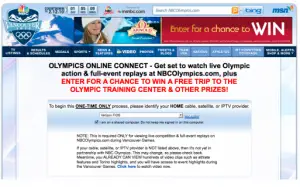 most Olympic coverage from the Internet by way of a TV Everywhere-type paywall. I figured, Comcast probably had something to do with it, and I was correct when, in early March, Sen. Herb Kolh (D-Wisconsin) of the anti-trust section of the Senate Commerce Committee sent NBC a letter expressing his alarm at finding Olympic content behind a paywall requiring a cable subscription for access. Kohl implied that this type of lock-down would be the end of free television as content increasingly moves away from “broadcast” networks to online services. It seems Comcast didn’t want the Olympics to be available anywhere but exclusively through cable service (unless you had an HDTV antenna, that is), and possibly colluded with other cable companies to create a lockout process. Now, remember, back in the days of network when cable was weak or simply non-existent… that kind of sports content was free for viewing, and even re-run endlessly in case you missed it. Yours for the price of a several short ads, and your attention span.
most Olympic coverage from the Internet by way of a TV Everywhere-type paywall. I figured, Comcast probably had something to do with it, and I was correct when, in early March, Sen. Herb Kolh (D-Wisconsin) of the anti-trust section of the Senate Commerce Committee sent NBC a letter expressing his alarm at finding Olympic content behind a paywall requiring a cable subscription for access. Kohl implied that this type of lock-down would be the end of free television as content increasingly moves away from “broadcast” networks to online services. It seems Comcast didn’t want the Olympics to be available anywhere but exclusively through cable service (unless you had an HDTV antenna, that is), and possibly colluded with other cable companies to create a lockout process. Now, remember, back in the days of network when cable was weak or simply non-existent… that kind of sports content was free for viewing, and even re-run endlessly in case you missed it. Yours for the price of a several short ads, and your attention span.
Consumer groups are up in arms about this, of course, but it’s almost impossible to stop the Comcast juggernaut from taking over NBC and removing content from Hulu and other currently free broadband streaming services or aggregators. Joining Comcast (who had previously considered going solo with their own OnDemand paywall system, 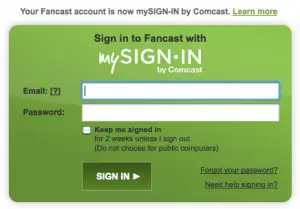 and their current Fancast site) in shutting out viewers who don’t have cable subscriptions, is Time Warner Inc. and their chief, Jeff Bewkes. In March, Comcast and T-W got together to put forward the TV Everywhere initiative and start spreading the gospel of their lockdown scheme. Unless you can authenticate, or prove, your subscription commitment to one of the signatory cable companies, you soon won’t be able to get much in the way of content via your computer or aggregator such as Boxee.
and their current Fancast site) in shutting out viewers who don’t have cable subscriptions, is Time Warner Inc. and their chief, Jeff Bewkes. In March, Comcast and T-W got together to put forward the TV Everywhere initiative and start spreading the gospel of their lockdown scheme. Unless you can authenticate, or prove, your subscription commitment to one of the signatory cable companies, you soon won’t be able to get much in the way of content via your computer or aggregator such as Boxee.
As more folks cut back their budgets for a variety of reasons, cable service has been one of those things to go… after all, you can only watch so much content, and much of what cable offers in its tiered blocks of programming isn’t really premium content anyway. Much of it is, in fact, regular teevee content from the networks, paid infomercials, home shopping, niche infotainment, foreign-language shows, and other endless infotainment type shows from cable-only networks such as History, Discovery and A&E. Finally, there’s some original programming that, when you come right down to it, is really the reason you get cable, other than having access to sports and 24-hour news. For even more premium content, like Hollywood movies, you must pay more for a separate tier. Cable companies are so good at getting you to pay for things you don’t use, that they even separated HD content from SD content and have you pay more for that as well (though that’s becoming a point of competition among cable companies, you gotta figure why you’d pay more for the same content in HD… sounds like just another cable company scam, and you’d be right on for feeling that way). Since viewers can really only watch one show at any given time (if you’re one of those fragmented families you might watch more at once), and since most of that content isn’t really of interest (we all have our niche tastes, but tend to gravitate toward popular general entertainment), we actually pay a huge cable bill every month for content we have no intention of consuming. To take in more content than one can view is physically impossible without help from a time-shifting device such as a DVR. For a recession weary public that has cut back on just about everything not deemed a necessity, it seems absurd to keep paying that all-encompassing cable bill, rather than just tune in for the shows you want at a lower cost or, in the best of all worlds, an à la carte service that allows the customer to program their choices for pennies on the dollar. After all, remember, much of this crap used to be free.
The cable companies shudder at the notion of ridding oneself of their services… Fat subscriber rolls keep them happy, and when there is churn without recovery (i.e. they lose a customer) they can’t sleep at night. After all, those rebroadcast fees they pay to send shows from NBC, CBS, ABC and FOX your way won’t pay themselves. The cable 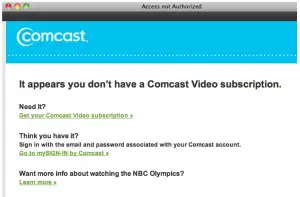 giants also point out that putting shows behind a paywall means better access to more shows with higher quality streaming available to all… for the price of a cable subscription. Of course, they’ve yet to hammer out how paying for a low-end tier will allow access to items generally blocked when paying for low-end cable service. Would someone with a basic package be able to get Expanded content like 24-hour news? Would HBO and Showtime premium content be offered as well? Sure higher quality content and more of it sounds great, but at what cost and for what kind of compromise? Those are the devilish details we’ll soon be forced to reckon with as TV Everywhere gains currency with more cable companies eager to choke-off the flow of free content.
giants also point out that putting shows behind a paywall means better access to more shows with higher quality streaming available to all… for the price of a cable subscription. Of course, they’ve yet to hammer out how paying for a low-end tier will allow access to items generally blocked when paying for low-end cable service. Would someone with a basic package be able to get Expanded content like 24-hour news? Would HBO and Showtime premium content be offered as well? Sure higher quality content and more of it sounds great, but at what cost and for what kind of compromise? Those are the devilish details we’ll soon be forced to reckon with as TV Everywhere gains currency with more cable companies eager to choke-off the flow of free content.
TV Everywhere, which has been tested for over a year, can be seen as simply a way for cable companies to continue with the old model of doing business. Rather than the consumer dictating how content will be delivered and accessed, the cable companies are adamant about being the gate-keepers no matter how content is viewed. This will result in consumers being forced to han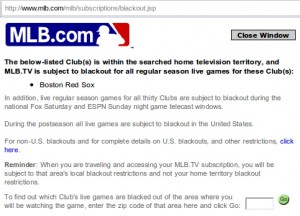 g onto expensive cable subscriptions if they want to access online content, and fattens the billions of dollars generated in subscription revenue rather than offering the consumer savings and a service that is tailored to their needs. Heads of other networks are seeing the promise of keeping fat bottom-lines rather than offering consumers a free-for-all paid only by advertising dollars. In the end, it remains to be seen how the roll-out of paywalls will ultimately affect online viewership. For every JustinTV, which is a huge pain in the ass to use and see a good show or sports event, there’s an MLB.com that understands what its customers want and, though they charge a hefty price tag, more than deliver the goods (though they have their own blackout issues that prevent customers from seeing local and big-market games in favor of arrangements with old-media companies and arcane licensing agreements). Consumers have already proven time-and-time again, that if a system is too onerous or costly, they’ll turn to alternatives such as grey-market goods and services… in this case P2P file networks, torrents and alternative streaming sites.
g onto expensive cable subscriptions if they want to access online content, and fattens the billions of dollars generated in subscription revenue rather than offering the consumer savings and a service that is tailored to their needs. Heads of other networks are seeing the promise of keeping fat bottom-lines rather than offering consumers a free-for-all paid only by advertising dollars. In the end, it remains to be seen how the roll-out of paywalls will ultimately affect online viewership. For every JustinTV, which is a huge pain in the ass to use and see a good show or sports event, there’s an MLB.com that understands what its customers want and, though they charge a hefty price tag, more than deliver the goods (though they have their own blackout issues that prevent customers from seeing local and big-market games in favor of arrangements with old-media companies and arcane licensing agreements). Consumers have already proven time-and-time again, that if a system is too onerous or costly, they’ll turn to alternatives such as grey-market goods and services… in this case P2P file networks, torrents and alternative streaming sites.
If TV Everywhere will be the only way to view online content, then it must take a page from those already doing it successfully like MLB.TV, and yes… Hulu, too. If it is to be the Hulu-slayer and also crush Apple in its own quest to control content, then TV Everywhere should also offer an alternative to those who shun cable service. Having a cable subscription should not be the only way to access content that, in earlier eras, used to be free… but in the future it seems, free as a concept will be a relic of the past.
The lockdown creates a trust issue, with cable companies becoming the only path to video content in any medium. This would seem to be an oligopoly that would hinder growth of alternative forms for receiving video content. One particular issue already at play: Cable companies, along with satellite and fiber-optic/phone companies, are dividing up the online world into regions and territories similar to the way they carved out markets for themselves as old media companies. This means that unless you live in a certain region, you’re going to be blocked from that content. Therefore, if I subscribe via Charter Communications in the San Fernando Valley, I still cannot get access to content from other cable companies via their sites because they’re out of my region.
Increasingly, we’ll see more of this anti-competitive shutout as TV Everywhere, or other paywall solutions, become the norm on the once formerly neutral Internet. Consumers of broadband VOD content should be writing their congressperson right about now… just sayin’.
WHITE SPACE

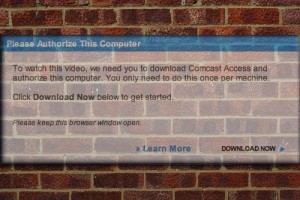
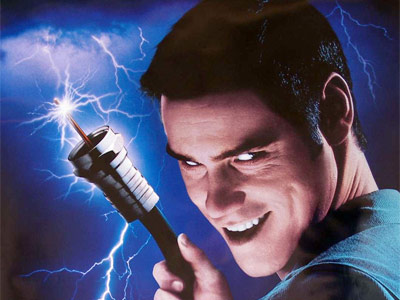


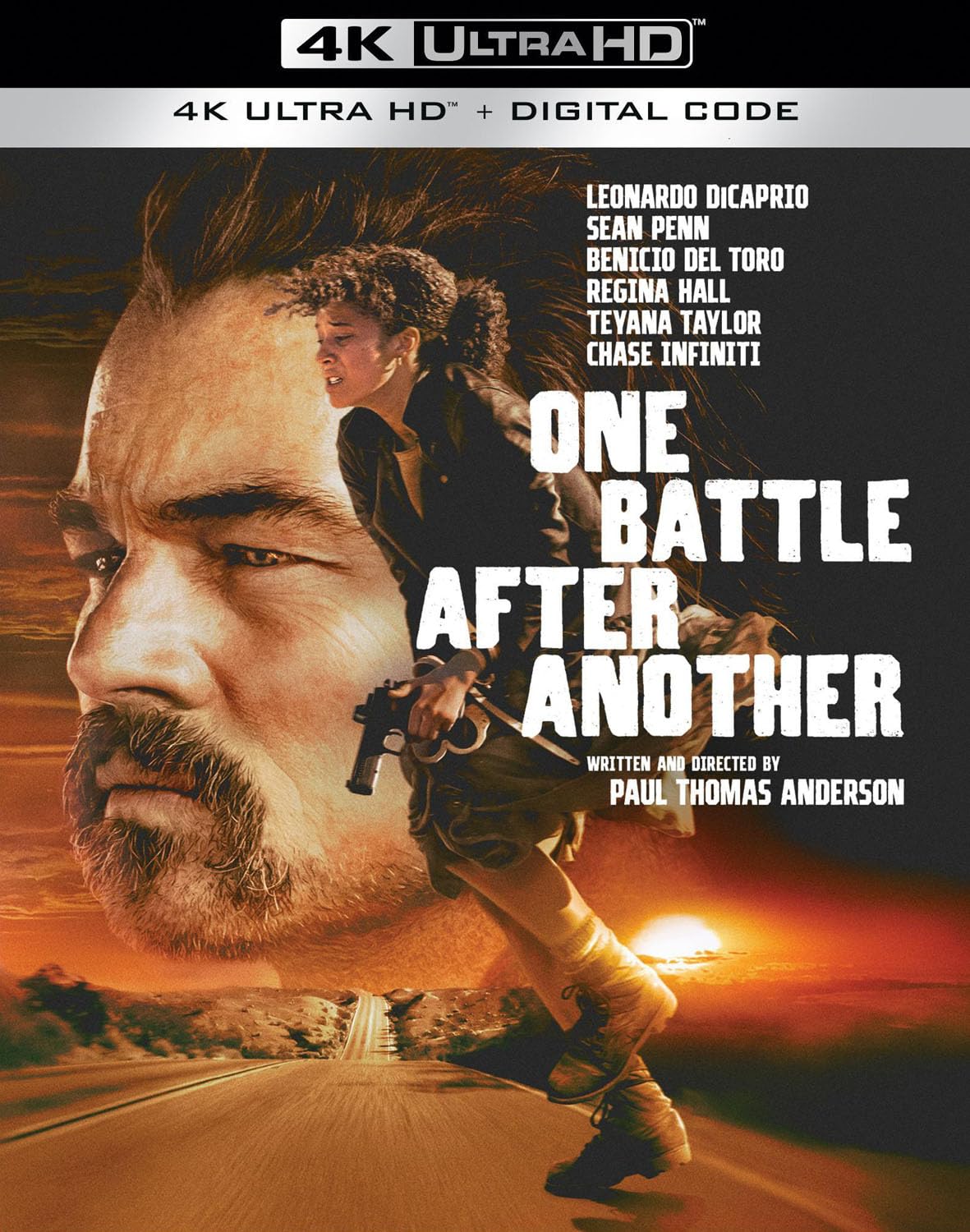



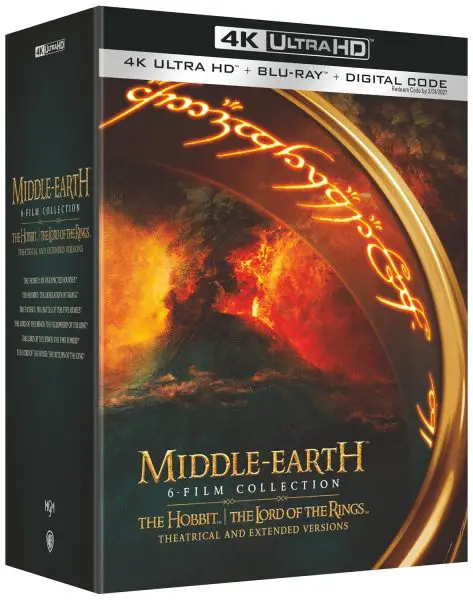

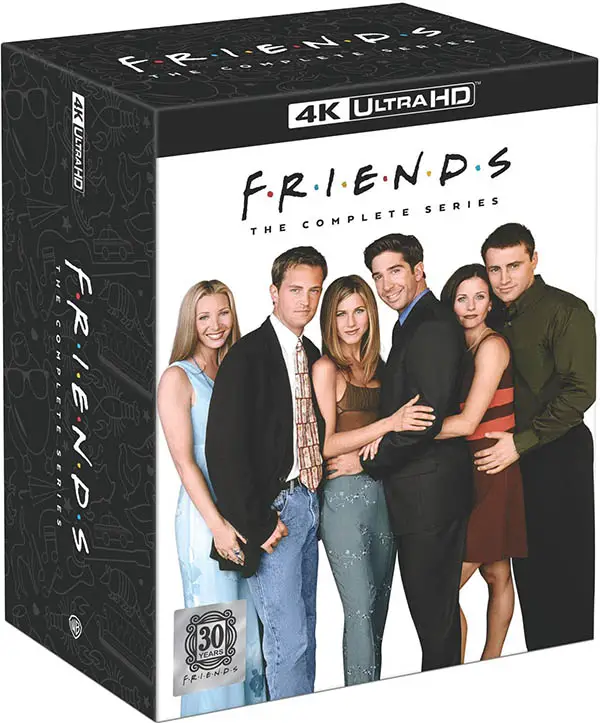

![How To Watch The 2026 Best Picture Oscar-nominated Movies [Updated] Bugonia (2025) frame grab](https://hd-report.com/wp-content/uploads/2026/01/Bugonia-2025-frame-grab-1-324x160.jpg)

This is a great article, I would like to add to it a little bit. As a DISH employee I know that we have released TV Everywhere as well. With this you are able to watch ALL of your live TV that you subscribe to with full DVR capability as well as access to your recordings. It is basically having my full TV in my pocket. Yesterday for the first time I was not bored when I was stuck at the mall shopping with my wife.
[…] position and become “dumb pipes”. That’s a less profitable lot for them, but a better outcome for consumers. from → Commercial Media, Communications Policy, Economics ← Pinto con Lata […]
Great article..very informative and another thing to make you go..hmmmmm! With technology comes greed…just look at what Wall Street and the Banking industry’s greed did to the economy..and why many of us cannot afford the extremely high cost of cable TV, cell phones, etc., that companies providing these services charge to customers of the USA (cable & cell phone charges in other countries are much less expensive). With so many people hurting in this economy, perhaps it’s time to dust off the Monoply, Scrabble and all our other game faves of old…and perhaps this could be a good thing..just think, we might just be communicating face to face again and enjoying each others company.